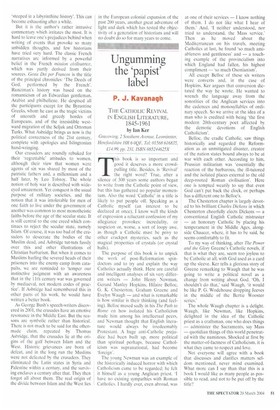Ungumming the 'papist' label
P. J. Kavanagh
THE CATHOLIC REVIVAL IN ENGLISH LITERATURE,
1845-1961
by Ian Ker Gracewing, 2 Southern Avenue, Leominster, Herefordshire HR 6 OQF, Tel: 01568 616835, f14.99, pp. 231, ISBN 085244625X This book is so important and good it deserves a more crowdpulling title. Besides, is 'Revival' the right word? True, after a silence of 300 years some authors began to write from the Catholic point of view, but this has gathered no popular momentum. Also the word 'Catholic' in a title is likely to put people off, Speaking as a Catholic myself (an interest to be declared at once), I know well the kinds of expression a reluctant confession of my allegiance provokes: incredulity, or suspicion or, worse, a sort of loopy awe, as though a Catholic must be privy to other crackpot mysteries, such as the magical properties of crystals (or crystal balls).
The purpose of this book is to unpick the work of post-Reformation spindoctors and to try and explain the way Catholics actually think. Here are careful and intelligent analyses of six very different writers — John Henry Newman, Gerard Manley Hopkins, Hilaire Belloc, G. K. Chesterton, Graham Greene and Evelyn Waugh — and what is remarkable is how similar is their thinking (and feeling). Belloc mused sadly in his The Path to Rome on how isolated his Catholicism made him among his intellectual peers, and Newman thought that English literature would always be irredeemably Protestant. A huge anti-Catholic prejudice had been built up, more political than spiritual perhaps, because Catholicism was supranational, had become 'foreign'.
The young Newman was an example of the historically induced horror with which Catholicism came to be regarded: he felt it himself as a young Anglican priest. 'I have no existing sympathies with Roman Catholics. I hardly ever, even abroad, was at one of their services — I know nothing of them. I do not like what I hear of them.' And. 'I neither understood, nor tried to understand, the Mass service.' Then as he moved about the Mediterranean on his travels. meeting Catholics at last, he found 'so much amiableness and gentleness' and — a touching example of the provincialism into which England had fallen, his highest compliment — 'so much Oxonianism'.
All except Belloc of these six writers were converts and, in the case of Hopkins, Ker argues that conversion dictated the way he wrote. He wanted to wrench the language away from the sonorities of the Anglican services into the cadences and monosyllables of ordinary speech. So we arrive at the idea of a man who is credited with being 'the first modern 20th-century poet affected by the demotic devotions of English Catholicism'.
Belloc, the cradle Catholic, saw things historically and regarded the Reformation as an unmitigated disaster, creator of the nation states bound always to be at war with each other. According to him, Prussian militarism was 'essentially the reaction of the barbarous, the ill-tutored and the isolated places external to the old deep-rooted Roman civilisation'. Here one is tempted wearily to say that even God can't put back the clock, or perhaps has a different one to Belloc's.
The Chesterton chapter is largely devoted to his brilliant Charles Dickens in which Chesterton cheerfully elects Dickens — a conventional English Catholic mistruster — an honorary Catholic by placing his temperament in the Middle Ages, alongside Chaucer, where, it has to be said, he seems comfortably to fit.
To my way of thinking, after The Power and the Gloty Greene's Catholic novels, if that is what they are, seem too joyless to be Catholic at all, with God used as a card up the sleeve. Ker tells a glorious story of Greene remarking to Waugh that he was going to write a political novel as a change from writing about God. 'Oh, I shouldn't do that,' said Waugh. 'it would be like P. G. Wodehouse dropping Jeeves in the middle of the Bet-tie Wooster series.'
The whole Waugh chapter is a delight. Waugh. like Newman, like Hopkins, delighted in the idea of the Catholic priest as a craftsman, one who does things — administer the Sacraments, say Mass — quotidian things of this world penetrated with the numinous. Shocked at first by the matter-of-factness of Catholicism, it is what they came to respect and love.
Not everyone will agree with a book that discusses and clarifies matters seldom mentioned, never mind examined. What more can I say than that this is a book I would like as many people as possible to read, and not to be put off by the title?


















































































 Previous page
Previous page